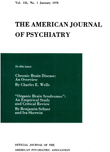THE EFFECT OF INTRAFAMILY DISCORD ON THE PROGNOSIS OF EPILEPSY
Abstract
In many cases of epilepsy, the seizures themselves may be controlled by treatment or are not incapacitating, and yet the patient is unable to make a satisfactory social and economic adjustment. The emotional handicaps produced by any chronic disease have long been recognized. In regard to epilepsy, however, faulty attitudes such as shame, over-protectiveness, over-strictness, etc., on the part of the patient's family constitute a particularly serious barrier to recovery. Typical case histories are presented, and suggestions are made as to methods of correcting the attitudes at fault.
Access content
To read the fulltext, please use one of the options below to sign in or purchase access.- Personal login
- Institutional Login
- Sign in via OpenAthens
- Register for access
-
Please login/register if you wish to pair your device and check access availability.
Not a subscriber?
PsychiatryOnline subscription options offer access to the DSM-5 library, books, journals, CME, and patient resources. This all-in-one virtual library provides psychiatrists and mental health professionals with key resources for diagnosis, treatment, research, and professional development.
Need more help? PsychiatryOnline Customer Service may be reached by emailing [email protected] or by calling 800-368-5777 (in the U.S.) or 703-907-7322 (outside the U.S.).



